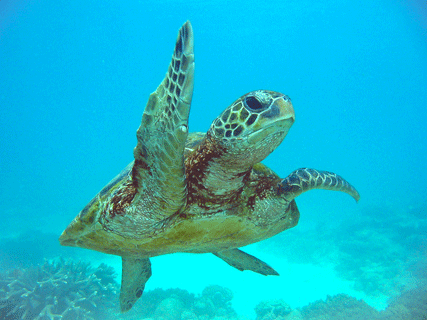
|
Published: 27 August 2012
Oceans news: 60-million-year investment worth protecting
More marine sanctuaries are the best way to protect Western Australia's unique marine biodiversity, according to an international group of scientists writing for the journal Global Ecology and Biogeography.
Dr Tim Langlois, a research associate with The University of Western Australia's Oceans Institute and lead author of the paper, said WA had long been known to have exceptional marine biodiversity.
‘We have a unique diversity of fish species that have adapted to living in our low-productivity and stable seascape over the last 60 million years,’ Dr Langlois said.
‘While Northern Europe and many parts of the world were in an ice age 150 million years ago, here in Western Australia, we have a much more stable geological history and water temperatures have been comparable over the last 60 million years.
‘Our marine biodiversity has evolved in a very stable environment, buffered by the flow of the Leeuwin current that warms our seas during winter.
‘This results in patterns of biodiversity and species seen nowhere else. In our stable system, many species have adapted by growing slowly, reproducing less and reaching great ages – attributes which make them very vulnerable to fishing.’
The recently announced Commonwealth Marine Reserves Network and Ngari Capes Marine Park in WA waters were a step in the right direction, he said.
Another international team of scientists has warned that life in the world's oceans faces far greater change and risk of large-scale extinctions than at any previous time in human history.
The researchers from Australia, the US, Canada, Germany, Panama, Norway and the UK have compared events which drove massive extinctions of sea life in the past with what is observed to be taking place in the seas and oceans globally today.
Three of the five largest extinctions of the past 500 million years were associated with global warming and ocean acidification – trends which also apply today, the scientists report in the journal Trends in Ecology and Evolution.
Other extinctions were driven by loss of oxygen from seawaters, pollution, habitat loss and pressure from human hunting and fishing – or a combination of these factors.
The researchers conducted an extensive search of the historical and fossil records to establish the main causes of previous marine extinctions and the risk of their recurring, explained co-author Professor John Pandolfi, of the ARC Centre of Excellence for Coral Reef Studies and The University of Queensland.
Professor Pandolfi is an authority on the fate of coral reefs in previous mass extinction events. ‘It is very useful to look back in time – because if you forget your history, you're liable to repeat it,’ he said.
‘The situation is not hopeless. In fact we have seen clear evidence both from the past and the present that sea life can bounce back, given a chance to do so.
‘For example, in Australia we have clear evidence of that good management of coral reefs can lead to recovery of both corals and fish numbers.
‘In effect, it says we need to stop releasing the CO2 that drives these massive extinction events, curb the polluted and nutrient-rich runoff from the land that is causing ocean “dead zones” manage our fisheries more sustainably and protect their habitat better.’
Another international collaboration involving Professor Ove Hoegh-Guldberg from the University of Queensland’s Global Change Institute has proposed a new strategy in Nature Climate Change for unconventional, proactive tactics in marine conservation.
‘It's unwise to assume we will be able to stabilise atmospheric CO2 at levels necessary to reduce or prevent ongoing damage to marine ecosystems,’ said Professor Hoegh-Guldberg.
‘A much broader approach to marine management and mitigation options, including manipulating the environment around corals and considering the translocation of reef-building corals, must be evaluated.’
These options may include:
-
Using shade to protect corals from the heat stress which leads to coral bleaching and death, albeit at small scales.
-
Managing ocean chemistry by adding globally abundant base minerals such as carbonates and silicates to the ocean to neutralise acidity, and improve conditions for shell formation in marine creatures.
-
Converting CO2 from land-based waste into dissolved bicarbonates that could be added to the ocean to provide carbon sequestration and enhance alkalinity.
The researchers believe more ideas need to be solicited and further research is required to determine which if any of these ideas could form the basis of safe and cost effective marine conservation strategies.
‘In lieu of dealing with the core problem – increasing emissions of greenhouse gases – these techniques and approaches could ultimately represent the last resort,’ said Professor Hoegh-Guldberg.
‘I hope we don't end up in the position but we must at least be prepared.’
Source: Universities of Western Australia and Queensland




